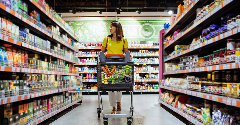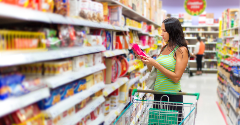News
High price of healthy eating in Thailand impacts young people
4 May 2023
Consumers in Thailand say they want to eat healthier but that fresh, nutritious food is too expensive and inaccessible for the average person, according to Mintel.
Like much of the rest of the world, Thai consumers have reconsidered their overall health and eating habits as a result of Covid-19. More than 50% of Thai consumers said they intend to educate themselves on nutrition and cook more often at home post-pandemic, according to recent data from Mintel.

But affordability is a key barrier amidst rising global inflation, and too often consumers resort to less expensive pre-packaged and highly processed foods out of necessity.
An opportunity to democratize healthy food
For many consumers, a healthy diet means consuming more fruits and vegetables and less sodium. About 70% of Thai consumers told Mintel that they think eating fruit and vegetables is an important habit for achieving good health, while about 21% said the same for cutting back on animal meat consumption.
“While the benefits of consuming a range of fruit and vegetables are generally well-understood, financial wellbeing strongly influences Thai consumers’ ability to add more to their regular diets,” said Pimwadee Aguilar, associate director of food and drink at Mintel Reports Thailand.
“Our research indicates that this challenge is more prevalent in rural areas, where 48% of consumers eat fruits and vegetables regularly compared to 56% of urban dwellers.”
Mintel’s data also revealed that 38% of Thai consumers want to eat better in order to improve their physical performance, 28% want to improve their mental wellbeing and 17% are driven by preventing or curing chronic diseases.
And even though the life expectancy in Thailand is improving, there are still inequalities in the country reflected in poor eating habits, nutritional gaps and the prevalence of non-communicable diseases, Mintel said.
“Brands need to do more to democratize healthy eating by making it affordable and convenient. Thailand produces an abundance of local, seasonal fruits and vegetables, which are often more affordable and ideal for promoting to consumers as healthy, budget-friendly options,” Aguilar said.
 Floating market in Thailand | © AdobeStock/Kalyakan
Floating market in Thailand | © AdobeStock/Kalyakan
Getting kids involved in nutrition
Since the pandemic, food and fuel prices have steadily increased around the world. There may be some relief on the horizon in Thailand, however. The Bangkok Post reported in March that inflation rates are expected to slow this year, after February saw the country’s lowest rate in 13 months.
For the last few years, the expense of healthy food has been a barrier to Thai consumers of all ages, but especially to young people. For this reason, UNICEF recently held a workshop in Bangkok for its Fix My Food campaign, which brings young people together to discuss healthy eating.
Similar to many other countries, the diets of consumers in Thailand are increasingly being filled with processed foods and beverages filled with sugar, salt and fat. These unhealthy options are cheaper, more convenient, and easier for children to access than fresh food.
“Undernutrition persists in the [Asia Pacific] region, and at the same time childhood overweight and obesity is rising faster than in any other region of the world. UNICEF aims to start reversing this trend, by making sure that healthy and nutritious food is widely available, affordable, and appealing,” UNICEF said.
In Bangkok, the workshop discussed how social media can negatively impact nutrition, such as a space for unhealthy food marketing, but that users with influence also leverage the platforms for good. Food influencers in Asia are encouraging young people to see the story behind their food, understand where it comes from and give greater value to what they choose to put in their body.
Fix My Food highlighted the importance of involving young people in food preparation, particularly through initiatives like community kitchens. But ultimately, UNICEF said that there needs to be stricter regulation for marketing unhealthy food and beverages to children, taxes on these products and healthier options offered in schools.
Related news

California companies required to disclose heavy metal content in baby food
10 Jan 2025
As of January 2025, baby food manufacturers selling in California must disclose test results for four heavy metals – arsenic, lead, cadmium, and mercury – via an on-pack QR code.
Read more
Snack trends, ingredient claims, and plant-based perceptions: Highlights from Fi Europe 2023, part 1
7 Dec 2023
Value-led snacking, sustainability storytelling, and the importance of having a ‘star ingredient’: we asked consumer analysts and market experts at Fi Europe about the trends and innovations that are shaping the food industry.
Read more
Confirmed: California bans four ‘toxic’ food additives
10 Oct 2023
Four food additives, including the colouring Red No. 3, will be banned in food in the US state of California over safety concerns, with public health campaigners hoping this will spark a nationwide ban in the coming years.
Read more
Advocacy groups condemn EU Commission for backpedalling on animal rights
3 Oct 2023
Amid rumours that the EU may abandon its plans to improve animal welfare in farming and end the use of cages, many stakeholders have condemned this possibility and urged the EU to reconsider.
Read more
Poland and Ukraine attempt to resolve grain dispute
29 Sep 2023
Poland and Ukraine have begun talks to try to resolve a dispute regarding the ban on Kyiv’s grain imports that prompted Kyiv to file a lawsuit to the World Trade Organization.
Read more
The EU may be set to scrap its sustainability commitments
27 Sep 2023
A speech delivered by President Ursula von der Leyen last week inferred that the EU could be drawing back on its commitments to create a more sustainable and healthier food system.
Read more
Industry first: Mosa Meat becomes first cultivated meat startup to gain B Corp certification
11 Sep 2023
A first for the industry, Dutch cultivated meat company Mosa Meat announced that it has received B Corp certification and will soon apply for regulatory approval across the globe.
Read more
German supermarket trials climate-centric pricing model
29 Aug 2023
German discount supermarket Penny has trialled increasing product prices to mirror their health and environmental costs.
Read more
EPR fee delay spurs concerns over UK’s sustainability commitment
8 Aug 2023
The UK government’s decision to push back the introduction of fees for the Extended Producer Responsibility (EPR) due to inflation has raised doubts about whether this sustainability commitment will ever be realised.
Read more
Latino-owned food startups tackle climate change
25 Jul 2023
A growing list of Latino-founded food and beverage startups in the US are putting sustainability at the forefront of their businesses for the sake of the planet.
Read more